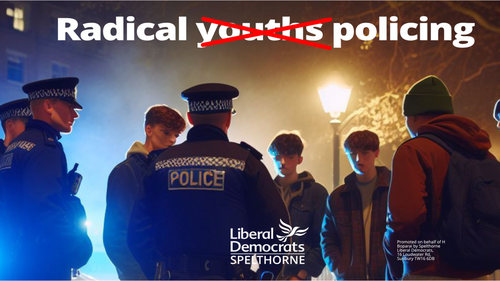A New Approach to Tackling Youth Violence: Investing in Communities

A few years ago, a mother in Spelthorne was walking down a local residential street with her 16-year-old son, Jack. They encountered a Police Community Support Officer, Peter, who greeted Jack with a smile, showcasing an exemplary model of community engagement in Spelthorne policing.
Jack, known for his mischievous nature, had built a positive rapport with the officer. Peter explained that he and his colleague actively engaged with local youths, not only to understand their dynamics and "what’s occurring" but also to identify out-of-area youngsters when in town – a testament to community policing in action.
This story vividly illustrates the Liberal Democrat approach to Spelthorne policing, advocating for a radical shift supported by a £1 billion investment. This significant investment aims to introduce two extra police officers into every ward, as highlighted in a favourable analysis by The Guardian in 2019.
Contrastingly, under the current Conservative Government, Spelthorne policing resources have been inefficiently utilized, leading to over-stretched and under-resourced frontline policing. A growing number of Spelthorne residents report never seeing police on foot patrols in their neighbourhoods, a concerning rise from a third in 2015.
Financial resources are disproportionately allocated to expensive and ineffective Police and Crime Commissioners, while thousands of Police Community Support Officers (PCSOs) are removed from the streets. Shockingly, just 12% of officers are assigned to frontline neighbourhood teams, exacerbating the challenges faced by our communities.
This misallocation of resources has resulted in Spelthorne being plagued by violent crime, burglaries, fraud, and anti-social behaviour. High rates of unsolved crime create a sense of impunity among criminals. Furthermore, damning revelations in the Casey Report, authoritarian anti-protest laws, and disproportionate Stop and Search tactics against minority communities have all contributed to the erosion of public trust in Spelthorne policing.
In the upcoming elections, the Liberal Democrat candidate Harry Boparai represents a beacon of change, advocating for increased community engagement, effective resource allocation, and a comprehensive approach to Spelthorne policing. His commitment aligns with the party's vision to address crime in Spelthorne, fostering a safer and more secure environment for all residents.
We can fix our policing - and rebuild confidence in our communities.
Liberal Democrats are calling for a return to proper community policing - a plan which actually works to tackle crime and restore trust. Liberal Democrat members have created a comprehensive, credible plan to deliver this.
Returning to community policing
- Free up existing officers’ time to focus on local crime, through measures like the creation of an Online Crime Agency and streamlining tasks which take up a disproportionate amount of officers’ time;
- Draw up a national recruitment, training and retention strategy to tackle the shortage of detectives;
- Scrap Police and Crime Commissioners and invest the savings in frontline policing instead.
Rebuilding public trust in the police
- Implement recommendations from the Casey report on vetting and misconduct procedures;
- End the disproportionate use of Stop and Search;
- Introduce mandatory police training on the impact of trauma on victims of violence against women and girls;
- Repeal the draconic and unworkable Public Order Act 2023.